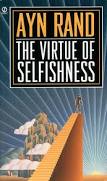 I just finished Ayn Rand's The Virtue of Selfishness, and I really liked its short essay format covering lots of different topics. I liked how it built upon the topics I saw in the previous fiction and nonfiction books. The point of the title essay is that "selfishness" has a bad rap and corrupted definition, and the true view of selfishness and individualism is in fact congruent with living a moral life. Below are my notes on each essay. 0 Intro
1 Comment
anon
1/15/2022 11:38:34 pm
The question is: why should one be stingy with love, and/or why should one always "judge others"? How is failing to do such, for example out of empathy, harmful - always, 100% of the time - to the self, or the other? Why is greyness inherently a problem? Why would it be wrong to, say, choose for yourself never to partake in anything even a bit evil but cast the more forgiving eye of gray when assessing *others* as a whole person, and not just individual actions (which are much easier), especially given the fact of your inherent ignorance of the entirety of their lives (most particularly, their whole history of mental states)? Why should you seem to do these things that default essentially to a sort of mild harm toward others? And why is helping someone outside of emergency inherently bad, even in situations where that help would not harm you? Especially if man is end in themselves, why does that not permit one to help so long as it does not harm? Is there some proof that help outside of rare situations always does harm, 100%, no exceptions?
Reply
Your comment will be posted after it is approved.
Leave a Reply. |
Archives
June 2024
Categories
All
Subscribe |
 RSS Feed
RSS Feed
